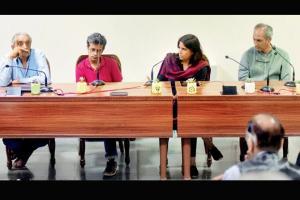Breach Candy meet puts lens on pollution and slant towards private cars as 'pet project' gets a bashing

(From left) Bittu Sahgal, Hussain Indorewala, Shweta Wagh and Rahul Kadri. Pic/Bipin Kokate
The anti-Coastal Road clamour just got louder as yet another group of people, under the banner 'Save our Coast Mumbai' held a panel discussion — The Road Not Taken: Mumbai's Coastal Road and Responsible Development — at Sophia College Convention Centre in Breach Candy on Tuesday evening.
ADVERTISEMENT
Car hour
The five-speaker panel comprised Bittu Sahgal, founder, Sanctuary Asia; Dr Nikhil Anand, anthropology professor, University of Pennsylvania; Rahul Kadri, partner, IM Kadri Architects; Shweta Wagh, founder, Collective for Spatial Alternatives and Hussain Indorewala, co-convenor, Amchi Mumbai, Amchi BEST.
Starting off the discussion, Indorewala said, "All our investments in the past have been geared towards cars. The number of private cars in the city doubles every 10 years. We keep adapting our infrastructure to suit the number of cars and in the process we change our city."
Kadri observed, "We must start defining the problem not as one of traffic but that of transportation. When we look through that prism, we can see how the footpaths need improvement and we should invest there first. We have invested in trains and the Metro. The Metro is scalable, which means you can add rails to it and to the train as well. When you change perspective from traffic to transportation, you realise that mass transportation is the only answer."
Green scene
Dr. Anand, who said facilities like the Coastal Road are an example of induced demand, which means the more road you provide, there are more people who will get out and drive. "It is time we incentivise greener modes of transport," he added.
When you talk of green, you cannot get greener than environmentalist Bittu Sahgal (who was wearing a blue shirt, by the way). Sahgal had the audience laughing as he said, "I come from Kolkata, where the favourite phrase is — 'what a nonsense' is this." He further said, "When you design a city for cars, the collateral damage is air pollution. We are selling doomsday. In a well-developed city, the well-off prefer public transport. The incentives to build this road, is not about solving problems, but about filling coffers."
Fish wish
Shweta Wagh painted a grim picture of ecological imbalances. Speaking about the impact on the fishing community, Wagh stressed that this was not just a South-Mumbai issue but something that concerns the entire megapolis. "We are losing our relationship with the sea," cautioned Wagh, adding, "Not just South Mumbai but locals everywhere should be worried. Juhu should be worried about the possibility of losing a slice of its beach, as reclamation causes erosion and beaches will be lost due to this. Central Mumbai people should be worried about flooding. Fishermen here practise artisanal fishing (low-scale, traditional subsistence fishing undertaken by individuals compared to large-scale commercial fishing). The BMC cannot ask them to do deep-sea fishing. In this way, we are infringing on their traditional and customary rights."
Voices come together
As the panel discussion segued into an interactive session with the audience, key takeaways from the spirited meet were — Why has this road made toll free? What is the agenda? The audience concurred loudly as speakers said the Warden Road intersection was going to see huge traffic jams and the plan was fundamentally flawed, as crores would be spent for a two-hour traffic jam. The audience also asked why citizens do not seem to have a say in projects. The meet ended on a rousing note that civil society needs to be more aware and active, to raise voices and join in action that will help change the world.
Catch up on all the latest Crime, National, International and Hatke news here. Also download the new mid-day Android and iOS apps to get latest updates
 Subscribe today by clicking the link and stay updated with the latest news!" Click here!
Subscribe today by clicking the link and stay updated with the latest news!" Click here!







